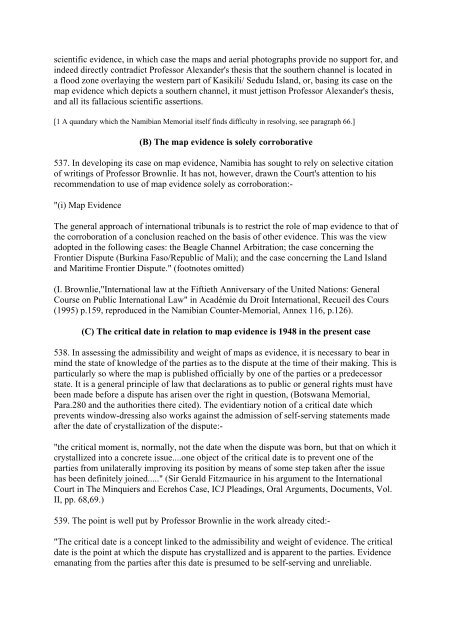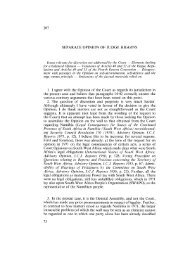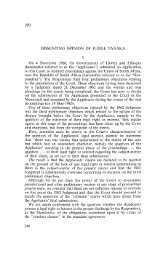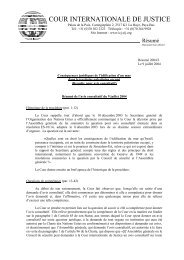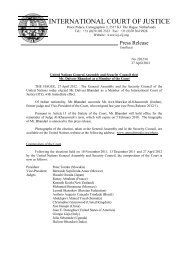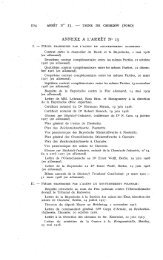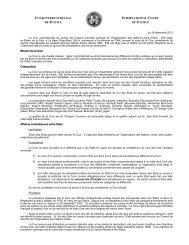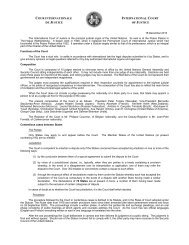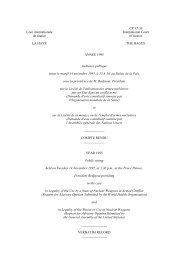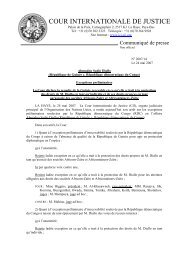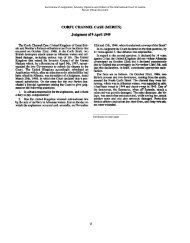botswana/namibia - Cour international de Justice
botswana/namibia - Cour international de Justice
botswana/namibia - Cour international de Justice
Create successful ePaper yourself
Turn your PDF publications into a flip-book with our unique Google optimized e-Paper software.
scientific evi<strong>de</strong>nce, in which case the maps and aerial photographs provi<strong>de</strong> no support for, and<br />
in<strong>de</strong>ed directly contradict Professor Alexan<strong>de</strong>r's thesis that the southern channel is located in<br />
a flood zone overlaying the western part of Kasikili/ Sedudu Island, or, basing its case on the<br />
map evi<strong>de</strong>nce which <strong>de</strong>picts a southern channel, it must jettison Professor Alexan<strong>de</strong>r's thesis,<br />
and all its fallacious scientific assertions.<br />
[1 A quandary which the Namibian Memorial itself finds difficulty in resolving, see paragraph 66.]<br />
(B) The map evi<strong>de</strong>nce is solely corroborative<br />
537. In <strong>de</strong>veloping its case on map evi<strong>de</strong>nce, Namibia has sought to rely on selective citation<br />
of writings of Professor Brownlie. It has not, however, drawn the <strong>Cour</strong>t's attention to his<br />
recommendation to use of map evi<strong>de</strong>nce solely as corroboration:-<br />
"(i) Map Evi<strong>de</strong>nce<br />
The general approach of <strong>international</strong> tribunals is to restrict the role of map evi<strong>de</strong>nce to that of<br />
the corroboration of a conclusion reached on the basis of other evi<strong>de</strong>nce. This was the view<br />
adopted in the following cases: the Beagle Channel Arbitration; the case concerning the<br />
Frontier Dispute (Burkina Faso/Republic of Mali); and the case concerning the Land Island<br />
and Maritime Frontier Dispute." (footnotes omitted)<br />
(I. Brownlie,"International law at the Fiftieth Anniversary of the United Nations: General<br />
<strong>Cour</strong>se on Public International Law" in Académie du Droit International, Recueil <strong>de</strong>s <strong>Cour</strong>s<br />
(1995) p.159, reproduced in the Namibian Counter-Memorial, Annex 116, p.126).<br />
(C) The critical date in relation to map evi<strong>de</strong>nce is 1948 in the present case<br />
538. In assessing the admissibility and weight of maps as evi<strong>de</strong>nce, it is necessary to bear in<br />
mind the state of knowledge of the parties as to the dispute at the time of their making. This is<br />
particularly so where the map is published officially by one of the parties or a pre<strong>de</strong>cessor<br />
state. It is a general principle of law that <strong>de</strong>clarations as to public or general rights must have<br />
been ma<strong>de</strong> before a dispute has arisen over the right in question, (Botswana Memorial,<br />
Para.280 and the authorities there cited). The evi<strong>de</strong>ntiary notion of a critical date which<br />
prevents window-dressing also works against the admission of self-serving statements ma<strong>de</strong><br />
after the date of crystallization of the dispute:-<br />
"the critical moment is, normally, not the date when the dispute was born, but that on which it<br />
crystallized into a concrete issue....one object of the critical date is to prevent one of the<br />
parties from unilaterally improving its position by means of some step taken after the issue<br />
has been <strong>de</strong>finitely joined....." (Sir Gerald Fitzmaurice in his argument to the International<br />
<strong>Cour</strong>t in The Minquiers and Ecrehos Case, ICJ Pleadings, Oral Arguments, Documents, Vol.<br />
II, pp. 68,69.)<br />
539. The point is well put by Professor Brownlie in the work already cited:-<br />
"The critical date is a concept linked to the admissibility and weight of evi<strong>de</strong>nce. The critical<br />
date is the point at which the dispute has crystallized and is apparent to the parties. Evi<strong>de</strong>nce<br />
emanating from the parties after this date is presumed to be self-serving and unreliable.


